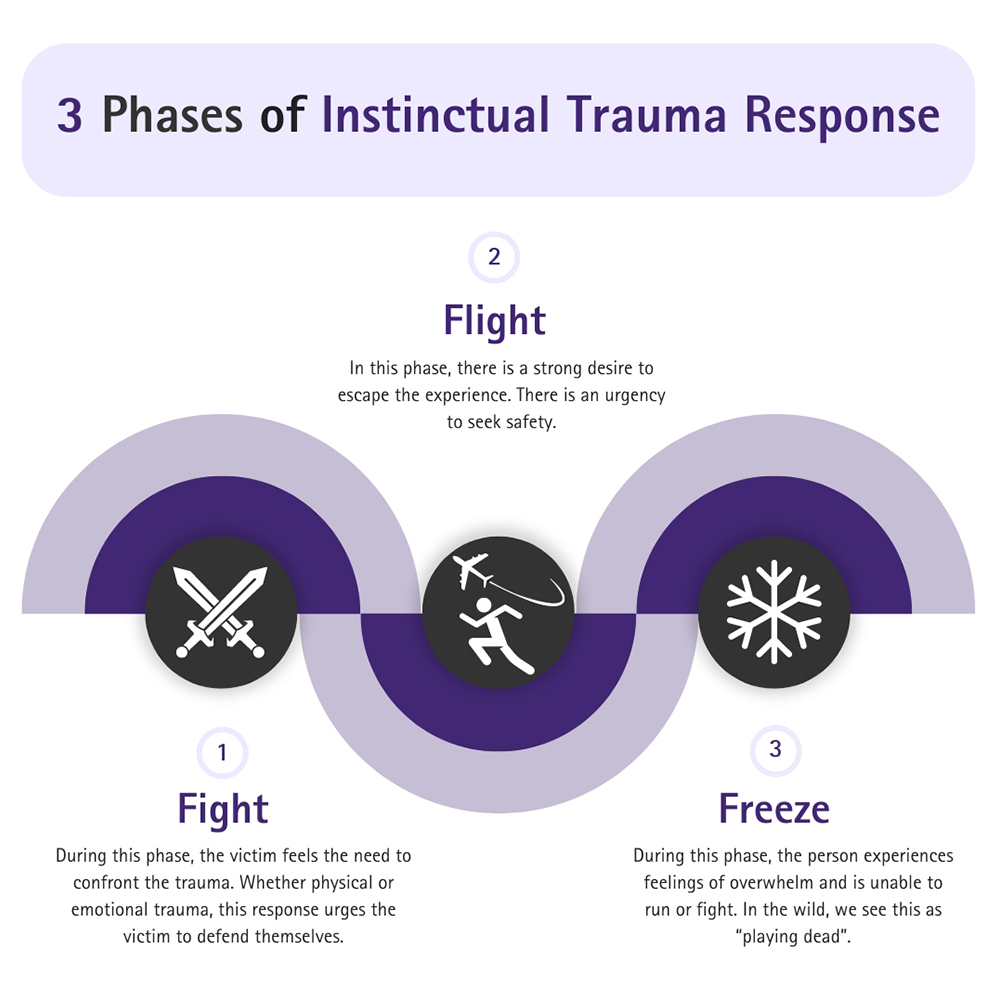What Is a Trauma Response?
A trauma response is a natural biological reaction that happens after a traumatic event. When you experience a traumatic event, your body goes into a fight-or-flight response. Your body produces high levels of adrenaline and cortisol.
Too much adrenaline and cortisol can have negative effects such as:
- Increased heart rate
- Elevated blood pressure
- Rapid breathing
- Compromised immune system
- Fatigue
- Muscle tension
- Headaches
- Digestive problems
- Weight gain
Chronic depression, or experiencing multiple traumatic events, increases the risk for these physical ailments.
What Are the Phases of the Instinctual Trauma Response?
There are three phases of instinctual trauma response including:
- Fight: During this phase, the victim feels the need to confront the trauma. Whether physical or emotional trauma, this response urges the victim to defend themselves.
- Flight: In this phase, there is a strong desire to escape the experience. There is an urgency to seek safety.
- Freeze: During this phase, the person experiences feelings of overwhelm and is unable to run or fight. In the wild, we see this as “playing dead”.
The specific order of these trauma responses varies by person and depending on the nature of the trauma.

Embrace Healing The Power of Trust in Therapeutic Relationships
“In my experience, the most effective aspect of therapy is the therapeutic relationship. Establishing trust between a client and clinician is the first step to healing.”
What Is the Instinctual Trauma Response (ITR) Method?

The ITR method helps clients activate and release the instinctual trauma response.
The ITR method involves:
- Identifying sensations: The therapist helps you identify sensations in your physical body that arise when trauma memories are triggered. This helps you increase awareness of your instinctual trauma response. The instinctual trauma response is activated in a safe and controlled environment.
- Release: Experiencing the instinctual trauma response in the safe environment of a therapist’s office provides an opportunity to release these sensations and discharge energy.
- Integration and grounding: After the release of trauma, the therapist guides you through grounding exercises to integrate the experience.
IRT is a new therapy, but the research has shown promising results for reducing trauma symptoms.
How to Stop Trauma Responses?
Once you are aware of your feelings, trauma responses, and negative beliefs, you can begin to decide what you want to change.
The steps involved in stopping a trauma response include:
- Somatic regulation: Once you learn to regulate your emotional responses and relax the muscles in your body, you can have control over your trauma response.
- Identify irrational beliefs: Practicing identifying and disputing irrational beliefs, as well as practicing acceptance will help you minimize future trauma responses.
- Practicing self-care: Self-care activities can help promote relaxation and help cope with stressors.
- Support system: Having a support system can help you manage trauma responses. Connecting with others who have overcome trauma or can support you non-judgmentally is tremendously beneficial to your mental health.
In my experience of working with hundreds of clients, awareness is the first step in trauma healing.
What Kind of Therapist Do I Need for Trauma Response?
To help manage your trauma response, you want a therapist who specializes in trauma therapy.
Some things to look for in a therapist include:
- Utilizing evidence-based approaches to heal trauma
- Appropriate education, such as a degree in mental health counseling, social work, or marriage and family therapy
- Personal experience with overcoming trauma
Discover the path to healing your trauma responses with ITR Therapy. Our certified clinical trauma specialists in West Palm Beach, FL, are dedicated to helping you overcome the grip of trauma and embrace a life of empowerment. Ready to make a change? Contact us today and take the courageous step towards instinctual trauma response therapy for a brighter tomorrow.

